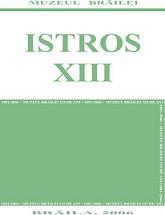Mari dregători şi negustori greci în Ţara Românească în a doua jumătate a veacului al XVI-lea
Great High Officials and Greek Merchants in Wallachia in the late 16th century.
Author(s): Claudiu NeagoeSubject(s): History
Published by: Editura Istros - Muzeul Brailei
Summary/Abstract: In the 14th and 15th centuries the Greek influence in Wallachia was obvious either by the connections with the Patriarchate in Constantinople or by the political and commercial ones with Byzantium. After the fall of Constantinople in 1453 under Ottoman dominion, the Greek influence could be seen by means of Serbian and Greek scholars, clergymen and nobility’s as refugees at the Court of Wallachia. The amount of south-Danube and especially Greek elements was to increase in the late of the 16th century when the Romanian Principalities became subject to the Ottoman Empire, first during the reign of Mircea Ciobanul and of his heir, Peter, later under the rule of Alexander II Mircea and of his son, Mihnea II the Renegade. This so called Country Greek had high official responsibilities in the administrative department of the country, acquired wide landed property either by prince donation and by purchase, or by being closely related to the local boyars. On of them was Mihalcea Caragea, who had the highest position in the country and had owned the largest real estates. As a great leader, a warrior and a perfect diplomat, he was a loyal subject to Peter Cercel (1583-1585) and later to his brother in law, Michael the Brave (1593-1601). By the end of the 16th century Wallachia had almost been overwhelmed by Greek both politically and socially, as well as economically and commercially, situation which brought about tough reactions of the local nobility. “După căderea Constantinopolului (1453) s-a înregistrat un adevărat exod al elitelor bizantine către Europa Apuseană, mulţi cărturari şi demnitari greci găsindu-şi refugiu în Italia. Alţii au căutat protecţie la curţile Moldovei şi Ţării Româneşti, iar unii au intrat în slujba otomanilor. Exemplul cel mai elocvent este cel al Cantacuzinilor, supuşi ai Porţii care, folosindu-se de protecţia şi sprijinul marelui vizir Mehmed Sököllü Paşa, au ajuns să numească sau să mazilească, după bunul lor plac, patriarhi şi domni. De altfel, până la sfârşitul veacului al XVI-lea, Cantacuzinii au avut un rol important în desemnarea de către Poartă a domnilor din Ţara Românească şi Moldova”[…]
Journal: ISTROS
- Issue Year: 13/2006
- Issue No: 1
- Page Range: 215-223
- Page Count: 9
- Language: Romanian
- Content File-PDF

